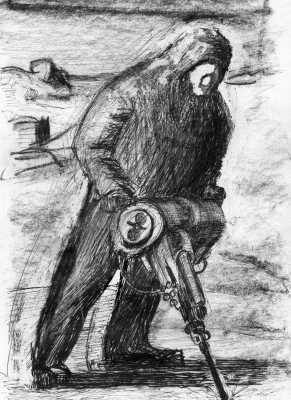Antarctic Thesaurus
a
b
c
d
e
f
g
h
i
j
![]() l
m
n
o
p
q
r
s
t
u
v
w
x
y
z
l
m
n
o
p
q
r
s
t
u
v
w
x
y
z
katabatic krill krill cycles Krill growth krill song krill watching
katabatic

Fred Elliott, Worsop
Mawson, 1955
The wind that blows out from the high pressure area over the antarctic continent came from the equatorial region where it was carried aloft by the great thermal pump of the sun. From there it flowed south; much of it descending over the polar region, thus creating the high pressure from where the GRADIENT winds flow north to the coast, just as the ice does. These are the major winds: but there is another wind caused by the denser surface air, cooled by contact with the plateau ice, rolling down the slopes and valleys, just like water. That is your katabatic in fact.
I made this sketch from photo taken in 1955. The Worsop drill is being used here to drill holes into rock, to take the anchors for hut and mast guys.
Fred Elliott, Weather observer with the Australian Antarctic Division, Heard Island (1953); Mawson (1954,1955,1958). Melbourne 2007
I did a lot on the physics of sound [at school] and all of that, much of which I've forgotten, and I s'pose that helped make me conscious of the nature of sound and the things which produce sound, the reverberations that develop ...in a way made me interested in the winds of the Antarctic, depending where they came from, they had different tones, and styles, short of the absolutely frightening crashing roar of the blizzards, but the, as I think Fred had explained, the cold wind at the top of the ice shelf in Antarctica, at night when the lower areas have lost the warming effect of the sun, that wind spills down the slopes into the lower regions and it's called a katabatic...it can be extremely harsh and strong.
Other times it's just preceded by a stirring, just a weak, the poetic word is cesurus [Latin-to fall], ah, and ah,which then can suddenly develop into a roar [emphasized], and then, suddenly subside, and may come again two or three times and totally disappear, or, develop into a flaming gale. I can't really talk about a 'flaming gale', but ah...um, that's just one, aspect.
The other thing, at night, on the ice shelf, you'd hear the strangest sounds: cracks and bangs, and these are just the movement of the ice over unevenness in the earth beneath so that you get a compression, and rarefaction, of the ice with constantly cracking noises, and then suddenly you'll get a bang [emphasized] as perhaps a section moves away, or an ice cliff falls...and so it's not unbroken, the night.
Oh, every night, every night, you'd hear something. It depends [soft laugh] how heavily you were sleeping I s'pose, yeah.
Jack Ward, Radio operater with Australian Antarctic Division, Melbourne 2007








